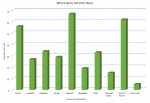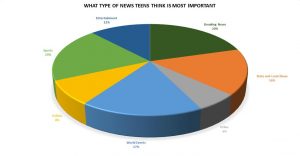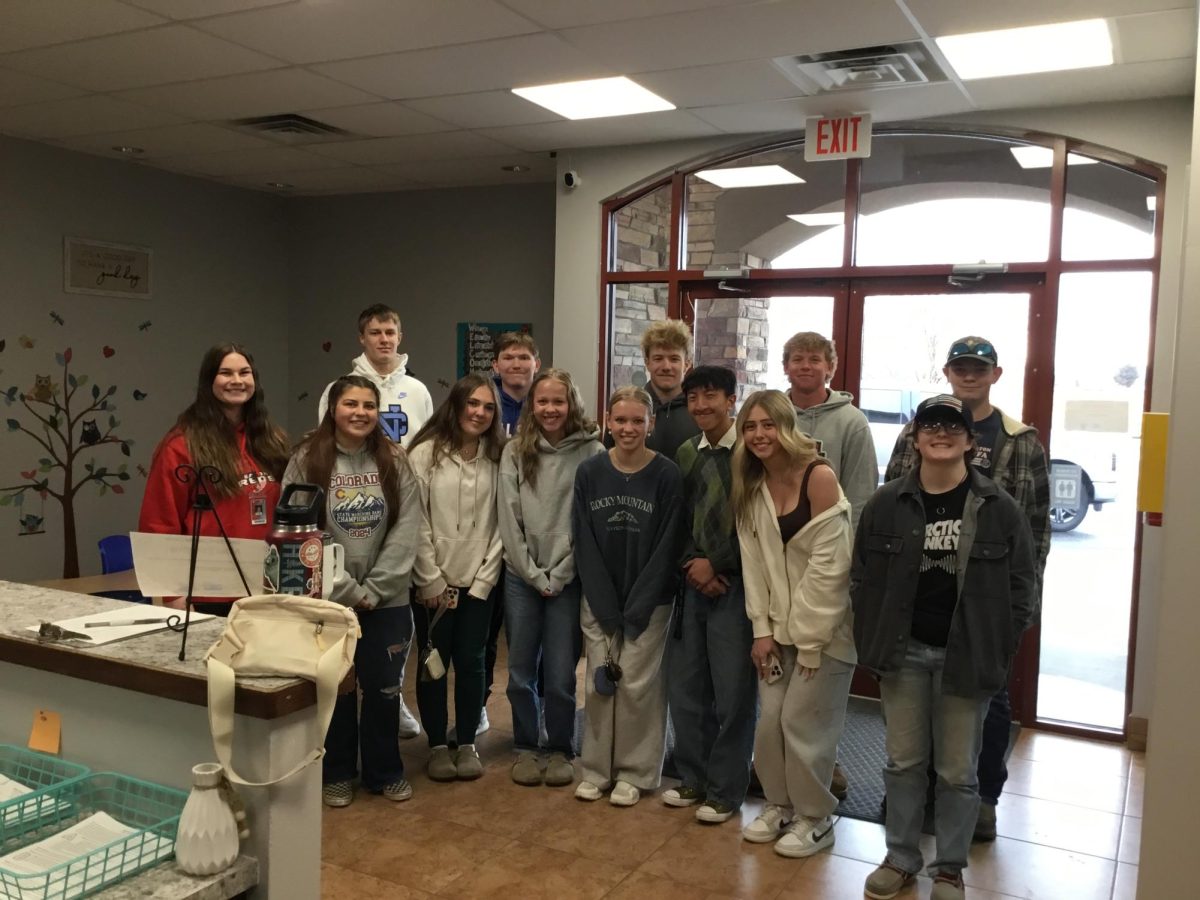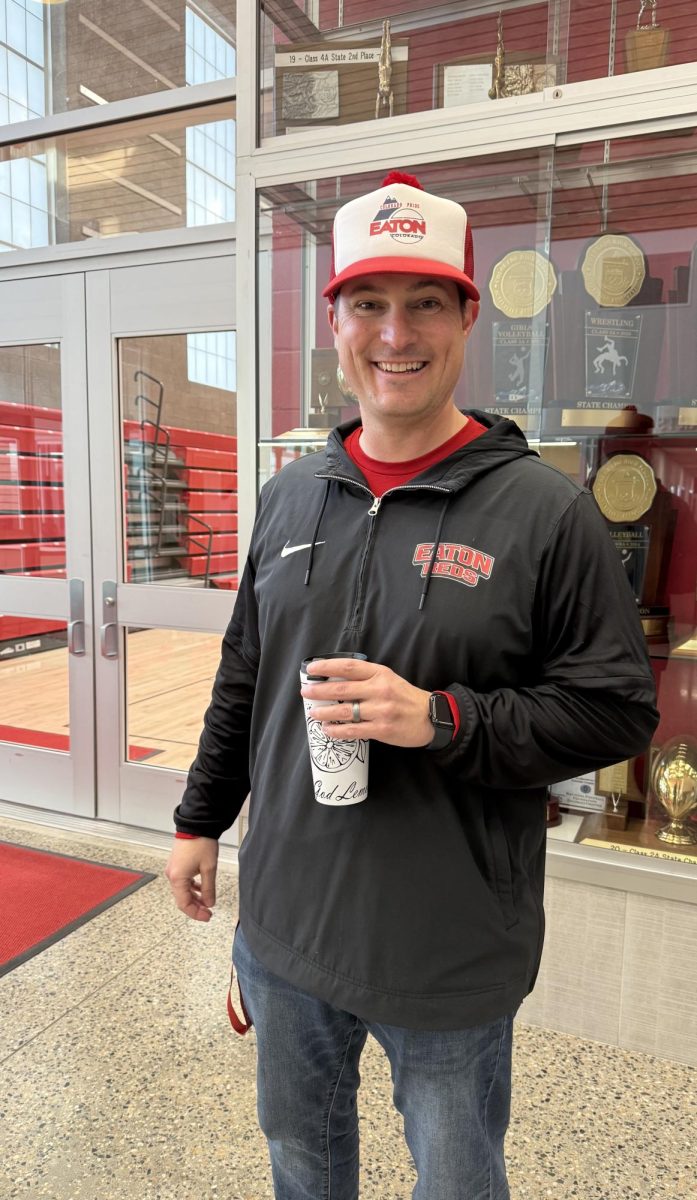By Sydney Booth and Tristin Brandly
Eaton Red Ink’s latest survey has revealed the truth about how teens get their news, or if they are even informed at all. This culmination of responses from 117 members of the student body has helped to shed some insight on the ways teens view and value the world they live in. Although most responses are divided, over half of those surveyed rarely watch the news, and other polls reveal that the young millennials in Eaton High School are generally uninformed.
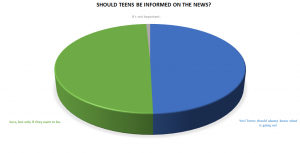 Of the 117 people surveyed, 58 people said that they rarely watch the news, which is 50.9 percent of the total people surveyed. 33.3 percent of people said that they watch the news sometimes (at least once per week), and only 15.8 percent said that they watch the news almost every day. The responses of the 50.9 percent that rarely watch the news correlates with the responses of the 49.6 percent that said teens should only be informed on the news if they want to be. In fact, the responses are split 49.6 percent to 49.6 percent on whether or not teens should be informed on the news. Only one person said it is not important at all. Myiah Scott (17) said, “Students need to be involved in the world around them, whether it be plugging into current events or staying active in them. Students are going to vote soon, possibly live on their own, and maybe be distant from family, we need to know how to dictate and control our lives in the changing world around us.” Jackson Contreras (19) had a slightly different idea due to his age, and said, “I think as we get older and can actually vote and contribute we will start watching the news, because it will be a part of our lives and we will be more mature. But right now as a 15 years old, I can’t do much to help so I don’t have a need to watch it at this point in my life.”
Of the 117 people surveyed, 58 people said that they rarely watch the news, which is 50.9 percent of the total people surveyed. 33.3 percent of people said that they watch the news sometimes (at least once per week), and only 15.8 percent said that they watch the news almost every day. The responses of the 50.9 percent that rarely watch the news correlates with the responses of the 49.6 percent that said teens should only be informed on the news if they want to be. In fact, the responses are split 49.6 percent to 49.6 percent on whether or not teens should be informed on the news. Only one person said it is not important at all. Myiah Scott (17) said, “Students need to be involved in the world around them, whether it be plugging into current events or staying active in them. Students are going to vote soon, possibly live on their own, and maybe be distant from family, we need to know how to dictate and control our lives in the changing world around us.” Jackson Contreras (19) had a slightly different idea due to his age, and said, “I think as we get older and can actually vote and contribute we will start watching the news, because it will be a part of our lives and we will be more mature. But right now as a 15 years old, I can’t do much to help so I don’t have a need to watch it at this point in my life.”
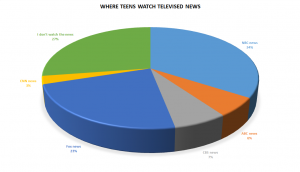 With this in mind, those who do watch the news prefer to watch either NBC news (38.4 percent) or Fox News (23.5 percent). Of that poll, 26.1 percent still stuck to their stance that they do not watch the news.
With this in mind, those who do watch the news prefer to watch either NBC news (38.4 percent) or Fox News (23.5 percent). Of that poll, 26.1 percent still stuck to their stance that they do not watch the news.
58.3 percent get their news from Facebook, with word of mouth following behind at 53 percent, and televised news at 47.9 percent. Only 12.8 percent get any form of news from Email (in the form of magazine subscriptions, updates, etc.), making it the lowest category.
As for the most important part of the news, those surveyed are divided. The leader is breaking news at 20.5 percent, but sports follows close behind at 19.7 percent. World events and local events are interesting statistics that come within one percent of one another. World events are most important to 17.1 percent, and state and local events are most important to 16.2 percent. With all of the political turmoil this year, only 8.5 percent of those surveyed said that politics is the most crucial part of the news. Entertainment tops politics at 12 percent.
In general, these findings show that most teens fit the typical stereotype of their generation: they are generally uncaring and mostly uninformed. Half of those surveyed do not believe that teens should be informed on the news unless they want to be. Lucas Halferty (16) said, “I believe that if we expose the future generations to the news, it might help their transition into adulthood and also allow for possible help on our end. More minds thinking about the same problem allows for a better chance of coming up with a solution.” For those that have an opinion and believe that teens should be informed on world events, they would not be in the minority or the majority within the survey.



